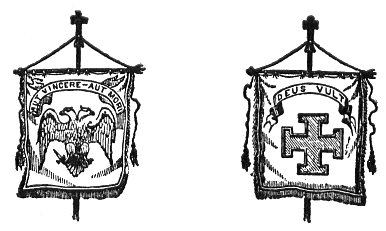p. 460
Sixth Part of the Code of the Illuminees.
Under the appellation of Intermediary Class of Illuminism might be comprehended all the Degrees which Weishaupt had borrowed from Freemasonry. In that case we should comprize under this denomination the three degrees of Apprentice, Fellow-Craft, and Master. But it has been already said, that these degrees are simply a passport for the Sect into the Masonic Lodges; and that its object may be less conspicuous, it leaves them in their original Masonic state. This, however, is not the case with the higher degrees of Scotch Masonry. The Sect shrewdly surmised that the views of these degrees coincided with their own: beside, it wanted some of these superior degrees, either for the direction of those Masonic Lodges which it composed of its own members, or who were to gain admittance, dominate, and preside over other Lodges which were not devoted to Illuminism. The great veneration in which the Scotch Knights are generally held by Masons, more strongly determined the Baron Knigge to make himself master of this degree, and engraft it on Illuminism. The Sect has constituted this into both an intermediary and a stationary degree. It is stationary for those into whom it despairs of ever infusing the principles required for a further admission to the mysteries; but it is only intermediary for those who have shown dispositions more accordant with the pursuits of the Sect. 1
Whatever may be his destiny, no Brother is ever admitted into this new degree, until he has previously given proofs of the progress he has made in the arts of Scrutator, whose code must have been his chief study since his admission to the degree of Major Illuminee. The secret Chapter of the Knights has had the precaution to propose certain questions to him to ascertain how far he is capable of judging of the state of the mind by exterior appearances. He will have had to answer, for example, to the following ones:—”What is the character of a man whose eyes are perpetually in motion, and whose countenance is changeable? What features denote voluptuousness, melancholy, and pusillanimity?” 2
As a further proof of the progress he has made, he is to transmit to his superiors another dissertation on the life of the hero whose name he bears for
p. 461
his characteristic. The history of his own life, which he had delivered in the antecedent degree, had laid open the whole of his existence, and all his actions through life. This new dissertation will show the Order what he admires or disapproves of in others, and will particularly demonstrate whether he has discovered those qualities in his patron which the Order wished he should imbibe and imitate when it gave him his characteristic. 3 Should any part of his life have escaped the vigilance of the Scrutators, he is still at liberty to give a new proof of his confidence in the Order; and this is described as a meritorious act; but he may reserve it for the cognizance of the Superior of the Order only. 4 He is then to declare under his hand-writing, that he looks upon the Superiors of Illuminism as the secret and unknown though legitimate Superiors of Freemasonry; that he adheres and always will adhere to the illuminized system of Masonry, as the best and most useful existing; that he utterly renounces every other association; that he is, in short, so persuaded of the excellence of Illuminism, that he fully adopts its principles, and firmly believes himself bound to labour, under the direction of his superiors, at the object and according to the intentions of the Order for the happiness of mankind. 5
After having received these numerous pledges, the Scotch Knights invite the new Brother to a secret Chapter, for such is the name given to the Lodges of this degree. It is hung with green, richly decorated and brilliantly lighted. The Prefect of the Knights, booted and spurred, is seated on a throne erected under a canopy all of the same colour. On his apron a green cross is seen, and on his breast the star of the Order; he wears the riband of St. Andrew in salter from right to left, and holds a mallet in his hand. On his right stands the brother sword-bearer, holding the sword of the Order; on his left the master of the ceremonies with a stick in one hand, and the ritual in the other. The Knights assembled are all booted and spurred, each girt with a sword, and all wear the cross suspended at their necks by a green riband. The Officers of the Order are to be distinguished by a plumage, and a priest of the Order compleats the Lodge. The Prefect then delivers himself as follows to the Candidate:

Moe is the founder of GnosticWarrior.com. He is a father, husband, author, martial arts black belt, and an expert in Gnosticism, the occult, and esotericism.




